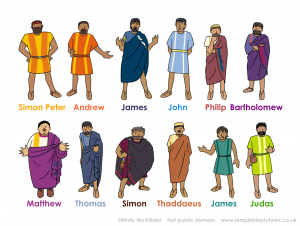
There are many theories of atonement in the history of Christian theology. Jesus reconciles us to God. Jesus saves. But how does that work? Whatever theory one chooses, this post claims, disciples must be an essential part. Without disciples Jesus’ work and his suffering are for nothing.
Twenty-third in a series on “The Worldly Spirituality of Mark’s Gospel” with help from Ched Myers’ Binding the Strongman: A Political Reading of Mark’s Story of Jesus. The Introduction and a Table of Contents are HERE.
What Myers calls the discipleship narrative is a central theme of Mark’s story of Jesus. Typically Christians locate this part of the Christian story in the Book of the Acts of the Apostles. We imagine Jesus accomplishes atonement somehow. Disciples later spread the word of salvation around the world. It makes a good division of labor, but is our work so distinct from Jesus’ work?
Hypothetical questions
I’m thinking of the atonement theory of St. Anselm and its derivatives through the centuries. Anselm says Jesus’ suffering paid off the infinite debt we owed to God because of our sin. He doesn’t mention disciples except as the ones who need saving and, being finite creatures, can’t pay the debt themselves. This post focuses intently on discipleship and asks “What if…?”
What if discipleship never really gets going? Or what if it dies with Jesus’ death and doesn’t come back to life? Would we have been saved? The point of this thought experiment is to show how intimately connected discipleship is to the work of Jesus, as Mark must also have thought if Myers’ interpretation is a good one.
So here are some “What if” hypotheticals:
- What if Jesus has been born, God incarnate, but the magi have not gone home “by another way”? What if Herod has killed Jesus as a boy of less than two years of age?
- Suppose Jesus has survived the Herod threat and carried on his ministry as the Gospels report. What if he died and rose, but the women never come to the tomb? What if the disciples, who have all fled, never hear the good news of resurrection?
- Finally, suppose the disciples see Jesus alive again but are too scared to act on this good news? What if the Spirit comes down on Pentecost to an empty room?
Would salvation, would atonement, work, under any of these hypothetical scenarios?
The challenge to atonement theory
The cases are strange enough that I think anyone would be inclined to say, “No, that’s ridiculous.” I think that would be right. But, if so, it’s a bit of a challenge to some of the ways we think about salvation.
Take the first scenario: Jesus dies as a baby. He is true God and true man. He certainly suffers. An interpretation of Anselm’s widely accepted doctrine of atonement that I learned long ago says:
Jesus gives his whole self for us on the cross, demonstrating God’s incomparable love for us, but it wasn’t strictly necessary. One drop of the infinitely Precious Blood would have been enough to make atonement for our sin’s infinite offense against God.
Baby Jesus certainly would have shed that much, but it’s hard to imagine atonement coming that way. It’s also hard to say why not, if we are saved, washed clean by the Blood.
The second and third scenarios, where Jesus completes his work as the Gospels record, make atonement seem a little more plausible, but still one tends to believe that it doesn’t work. Something is missing, and that something is a community of faithful disciples. Salvation doesn’t come directly from Jesus to each individual soul.
A brand new “Jesus” group
To make that last point, let’s devise another hypothetical:
Grant either scenario #2 or #3 above. Jesus dies and even rises, but there are no disciples. Then suppose some ancient historian, perhaps a Roman soldier on duty in Palestine, has written the story of Jesus. Suppose the manuscript has stayed hidden until it shows up in someone’s basement or attic after, say, two millennia. It’s not too far-fetched. Two millennia is about how long it took to discover the Dead Sea Scrolls.
Now someone could fall in love with the story and make a million copies or upload it to the internet. Pretty soon others start getting really interested in this Jesus character. They form study groups and try to follow and spread Jesus’ way.
There are a lot of the same elements as in Christianity today. There is a Scripture. We can imagine a kind of priesthood, an initiation ceremony, and a commemorative meal. What’s missing is any real contact with Jesus. No one is touched by Jesus, and no intermediaries between today and the ones Jesus really did touch are in the picture. It’s a story about Jesus, but it’s a completely new discipleship narrative.
It might look the same, but it’s not the community Jesus started, and I dare say it would feel different. It would feel like you were following Jesus’ message but not Jesus himself. That’s the thing that makes Christians different from any other group of disciples that I know of. We follow a person, not just that person’s teaching.
Resurrection and discipleship
Mark pays very little attention to Jesus’ actual resurrection. It takes up only four English words, “he has been raised.” Mark’s Greek took only one word to say it. Mark is much more interested in where you can find Jesus, as the young man told the women at the tomb:
He is not here. Behold, the place where they laid him. But go and tell his disciples and Peter, ‘He is going before you to Galilee; there you will see him, as he told you.’ (16:6-7)
Jesus started his discipleship program in Galilee. Galilee is where it begins anew. Or does it? This is how Mark ended his Gospel:
Then [the women] went out and fled from the tomb, seized with trembling and bewilderment. They said nothing to anyone, for they were afraid. (16:8)
How could Mark’s story end this way? Shouldn’t it have ended something like this?
And [the women] reported all the instructions briefly to Peter’s companions. Afterwards Jesus himself, through them, sent forth from east to west the sacred and imperishable proclamation of eternal salvation. Amen. (Mark 16:20b)
That’s one of two endings that later scribes added, with inferior literary skill, to what Mark wrote. Mark had a better idea. There is no “Amen” or “The end” to his story. He doesn’t let us leave the story and go on to something else. If we don’t finish the story, it remains unfinished. And the only way to finish the story is to become a disciple and embrace the life of the new household of God.











